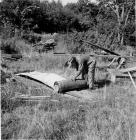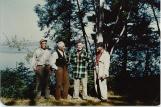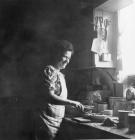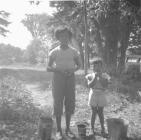1
Our livelihood depended on gathering, hunting, fishing and trapping [except for the smallincome that we made by leasing our islands in the Ottawa River before the Crown denied us
that right in 1839], the government had not yet formally acknowledged our rights to any of our
land in Upper Canada/ Ontario.
6
ROYAL PROCELAMATIONAt the conquest of 1759 when the French were conquered by the British, the British specified in the 1763 Royal Proclamation that Ĺthe Indians should not be molested on their hunting groundsĺ, and that we could only sell our lands after a public council for that purpose was held, and that our lands could not be sold until they were ceded [surrendered].
Hunting Rights
By 1822 the Crown had ruled that it could not appoint exclusive hunting territories for the various tribes (Nations); as a result, our former strictly-observed and -enforced hunting land boundaries were ignored, and our ability to provide for our own sustenance was compromised, once again.
7
Harvey Ruddy: Indian Agent, Finally Catches One1950s
PikwÓkanagÓn, ON
 Credits:
Credits:Harvey Rudd
Matt Bernard
8
Further, Ontario refused to allow lands near the head waters of the York branch of theMadawaska River to be set aside for our use in 1897 after our 1866 license of occupation
lapsed; is seemed clear the government of Ontario didnĺt want us close to Algonquin Park,
which had been established on our land in 1893 with no consideration given us.
Although all of our traditional activities were outlawed within the boundaries of Algonquin Park, we continued to trap and hunt these lands, where we had always trapped and hunted. After the park wasestablished, we found that we had to out-maneuver the park rangers. We were unable to set
permanent trap lines and if we set up a small shelter to stay in during our working time on the
land which was often more, but no less than a month at a time, in cold weather, our shelter
would be burned down.
9
Matt Bernard Birch Bark Harvesting1950s
Algonquin Provincial Park, ON
 Credits:
Credits:Matt Bernard
Jill Closter
10
Because Aboriginal rights were not recognized, our men would becharged and fined for hunting infractions in the park while trying to provide food for their
families.
12
We had to endure many years of this legal action in order to establish precedents thatrecognized our Aboriginal rights; in 1991 the first hunting and fishing agreement between the
Ontario government and the Algonquins of PikwÓkanagÓn was established.
Today there are nineteen established trap lines in the park,
but there is little money in trapping, and there is a much smaller animal population, especially
of beaver, since the tree cycle changed from poplar and birch to evergreens.
Our reliance on wild meat as a food source has dwindled: people donĺt snare rabbits, partridge, muskrat or deer like before when bullets were expensive;





